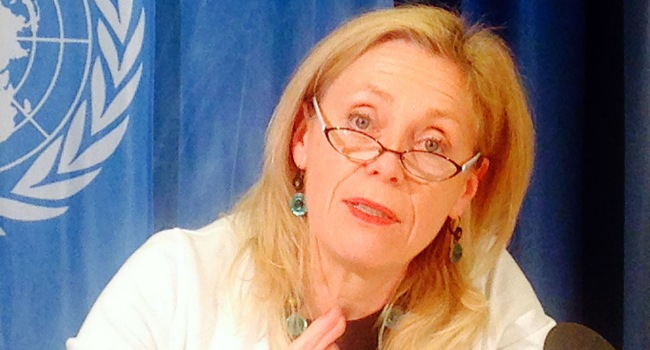International
COVID-19: Over 15m cases of acute malnutrition expected in West, Central Africa —UNICEF, WFP

The United Nations Children’s Funds (UNICEF) and the United Nations World Food Programme (WFP) has warned that no fewer than 15.4 million cases of acute malnutrition in children under five years old are expected in 2020 in West and Central Africa amid the COVID-19 pandemic.
This was revealed in a joint statement on Friday by UNICEF and WFP which warned that one third of them (children) will suffer from its most severe form – if adequate measures are not immediately put in place.
The figure represents a 20 per cent increase from earlier estimates, in January 2020, according to an analysis of the combined impact of food insecurity and COVID-19 on acute malnutrition in 19 countries of the region.
“Children suffering from severe acute malnutrition are at higher risk of COVID-19-related complications. Whereas, good nutrition for children, starting from their early days, protects them against illnesses and infections, and supports their recovery when they become ill,” said Marie-Pierre Poirier, UNICEF Regional Director for West and Central Africa.
“Ensuring the continuity of preventive and lifesaving health and nutrition services, building shock-responsive social protection systems, protecting livelihoods and supporting families’ access to water, hygiene and healthy food are critical for child survival and long-term development.”
READ ALSO: COVID-19 may push millions of children into child labour —ILO, UNICEF
Conflict and armed violence have led to massive population displacements and drastically limited access to basic social services, leading child malnutrition to increase to unprecedented levels.
The coronavirus disease is exacerbating fragile contexts in West and Central Africa, such as in the Sahel region across Burkina Faso, Chad, Mali, Mauritania, Niger and Senegal, which were already stricken with food insecurity and malnutrition.
Before the COVID-19 pandemic, 4.5 million cases were anticipated to suffer from acute malnutrition in 2020, in these 6 countries. Today, with growing insecurity and COVID-19, that number has jumped to almost 5.4 million.
“Children suffering from severe acute malnutrition are at higher risk of COVID-19-related complications. Whereas, good nutrition for children, starting from their early days, protects them against illnesses and infections, and supports their recovery when they become ill,” said Marie-Pierre Poirier, UNICEF Regional Director for West and Central Africa. “Ensuring the continuity of preventive and lifesaving health and nutrition services, building shock-responsive social protection systems, protecting livelihoods and supporting families’ access to water, hygiene and healthy food are critical for child survival and long-term development.”
Several factors threaten the nutritional status of children under five in West and Central Africa. These include household food insecurity, poor maternal nutrition and infant feeding practices, conflicts and armed violence, population displacement, high levels of childhood illnesses and water-borne diseases such as diarrhea, fragile health systems, poor access to clean water and sanitation, and chronic poverty.
“Thousands of families will be unable to provide their children with the nutritious food needed for their proper growth and development,” said Chris Nikoi, WFP Regional Director for West and Central Africa. “We must work together to improve access to nutritious foods and ensure that there are strong preventive actions that protect children from falling into the vicious trap of malnutrition and sickness.”
Join the conversation
Support Ripples Nigeria, hold up solutions journalism
Balanced, fearless journalism driven by data comes at huge financial costs.
As a media platform, we hold leadership accountable and will not trade the right to press freedom and free speech for a piece of cake.
If you like what we do, and are ready to uphold solutions journalism, kindly donate to the Ripples Nigeria cause.
Your support would help to ensure that citizens and institutions continue to have free access to credible and reliable information for societal development.
























